-
 bitcoin
bitcoin $87959.907984 USD
1.34% -
 ethereum
ethereum $2920.497338 USD
3.04% -
 tether
tether $0.999775 USD
0.00% -
 xrp
xrp $2.237324 USD
8.12% -
 bnb
bnb $860.243768 USD
0.90% -
 solana
solana $138.089498 USD
5.43% -
 usd-coin
usd-coin $0.999807 USD
0.01% -
 tron
tron $0.272801 USD
-1.53% -
 dogecoin
dogecoin $0.150904 USD
2.96% -
 cardano
cardano $0.421635 USD
1.97% -
 hyperliquid
hyperliquid $32.152445 USD
2.23% -
 bitcoin-cash
bitcoin-cash $533.301069 USD
-1.94% -
 chainlink
chainlink $12.953417 USD
2.68% -
 unus-sed-leo
unus-sed-leo $9.535951 USD
0.73% -
 zcash
zcash $521.483386 USD
-2.87%
Jito liquid staking explained
Jito liquid staking lets Solana users stake SOL and receive jitoSOL tokens, which can be used in DeFi while earning staking rewards.
Jul 19, 2025 at 08:08 pm
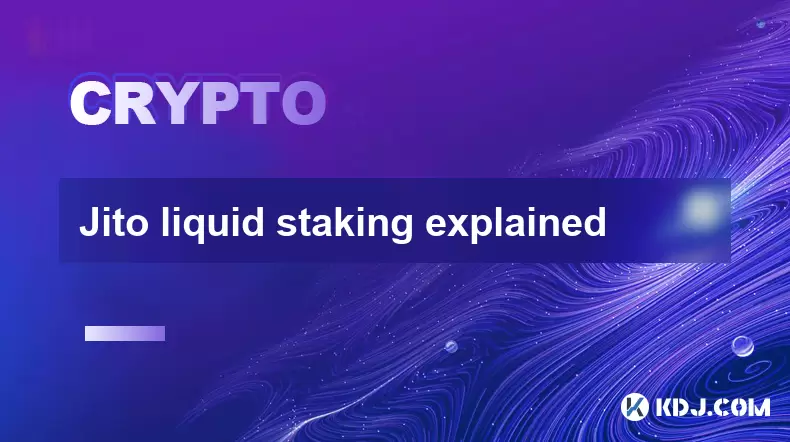
What Is Jito Liquid Staking?
Jito liquid staking is a decentralized staking solution that allows users to stake their assets while maintaining liquidity through the issuance of a tokenized representation of their staked assets. This method enables users to participate in network security and earn staking rewards without locking up their funds. Jito, as a protocol, primarily operates on the Solana blockchain, and it introduces a new paradigm where users can freely trade or utilize their staked positions in DeFi protocols.
Unlike traditional staking, where assets are locked and illiquid, Jito liquid staking mints a derivative token—commonly known as jitoSOL—which represents the user's staked SOL. This token can be used in various DeFi applications, such as lending, borrowing, or liquidity provision, thereby enhancing capital efficiency.
How Does Jito Liquid Staking Work?
The process of Jito liquid staking is designed to be seamless and trustless. When a user deposits SOL into the Jito protocol, the system automatically distributes the stake across a set of high-performance validators selected by the Jito team. These validators are optimized for performance and decentralization, ensuring that staked funds are secure and efficiently utilized.
Upon depositing SOL, users receive jitoSOL tokens in return. These tokens are pegged 1:1 to the value of the staked SOL and accrue staking rewards over time. The rewards are reflected in the increasing value of jitoSOL, which can be redeemed at any time for the underlying SOL plus accumulated yield.
- Users deposit SOL into the Jito staking pool.
- The protocol stakes the SOL with a set of high-performance validators.
- Users receive jitoSOL tokens representing their stake.
- Staking rewards increase the value of jitoSOL over time.
- Users can redeem jitoSOL for SOL at any time.
Why Choose Jito Over Traditional Staking?
Traditional staking often requires users to lock up their assets and lose access to them until they are unstaked, which can take several days. With Jito liquid staking, users retain liquidity and flexibility, enabling them to engage in other DeFi activities. This is particularly beneficial in a high-yield, fast-moving ecosystem like Solana.
Another key advantage is validator optimization. Jito uses a dynamic validator selection process to ensure that staked funds are distributed among the most efficient and reliable validators. This maximizes yield and reduces the risk of downtime or slashing.
Furthermore, Jito liquid staking removes the technical barrier of choosing and managing validators manually. Users don't need to research or monitor validator performance, as Jito's system handles this automatically.
How to Use Jito Liquid Staking: A Step-by-Step Guide
Using Jito liquid staking is straightforward, and the process can be completed in a few simple steps. Below is a detailed guide to help users stake SOL and receive jitoSOL tokens.
- Connect a Solana wallet (such as Phantom or Solflare) to the Jito website.
- Ensure that the wallet contains SOL to be staked.
- Navigate to the “Stake” section on the Jito dashboard.
- Enter the amount of SOL to deposit.
- Confirm the transaction via the wallet interface.
- Wait for the transaction to be processed and receive jitoSOL tokens.
Once jitoSOL is received, users can freely transfer, trade, or use it in DeFi protocols that accept it as collateral. To unstake, users simply need to return the jitoSOL to the Jito protocol and receive the equivalent amount of SOL plus accrued rewards.
It's important to note that jitoSOL is not a synthetic token but a receipt for the underlying staked SOL. This ensures that users always have a direct claim on their assets.
Security and Trustlessness in Jito Liquid Staking
One of the core principles behind Jito liquid staking is security. The protocol is built on a transparent and audited smart contract infrastructure that ensures user funds are protected. Additionally, the validators used by Jito are independently operated and vetted for reliability and uptime.
The system is designed to be non-custodial, meaning that users never relinquish control of their private keys. All staking operations occur through permissionless smart contracts, and users can always verify the integrity of their deposits and withdrawals.
Moreover, Jito does not impose slashing penalties on users. If a validator misbehaves or is penalized, the protocol absorbs the loss to protect the staker. This makes Jito liquid staking a safer alternative to direct validator staking.
FAQ: Frequently Asked Questions
Q: Can I stake any token other than SOL with Jito?A: Currently, Jito liquid staking is limited to SOL only. The protocol does not support other tokens or assets for staking at this time.
Q: Are there any fees associated with using Jito?A: Jito charges a small performance fee on the staking rewards earned. This fee is used to maintain and improve the protocol infrastructure.
Q: Is jitoSOL transferable or tradeable?A: Yes, jitoSOL is an ERC-20 compatible token and can be freely transferred, traded, or used in DeFi protocols that accept it as collateral.
Q: How often are staking rewards distributed?A: Staking rewards are continuously accrued and reflected in the value of jitoSOL. There is no fixed distribution schedule, as the value increases in real-time with network rewards.
Disclaimer:info@kdj.com
The information provided is not trading advice. kdj.com does not assume any responsibility for any investments made based on the information provided in this article. Cryptocurrencies are highly volatile and it is highly recommended that you invest with caution after thorough research!
If you believe that the content used on this website infringes your copyright, please contact us immediately (info@kdj.com) and we will delete it promptly.
- Beyond the Forecast: Is Carol Kirkwood's Departure a Whisper of BBC's Lingering 'Token Woman' Problem?
- 2026-02-01 16:25:01
- Bitcoin Plunges Amidst Liquidity Worries: A Record Low for Crypto Sentiment?
- 2026-02-01 16:25:01
- Pi Network's Mainnet: A Crypto Milestone Unveils a Complex Market Picture
- 2026-02-01 16:20:02
- Top Watch: Emerging Cryptocurrencies Charting New Territories in 2026
- 2026-02-01 16:15:01
- Wall Street Whales, DeFi Dynamos, and the Cross-Asset Surge: Decoding BTC, ETH, and Hyperliquid's Latest Plays
- 2026-02-01 13:00:02
- Dogecoin's Identity Crisis: From Meme Darling to Digital Identity Quandary
- 2026-02-01 16:15:01
Related knowledge
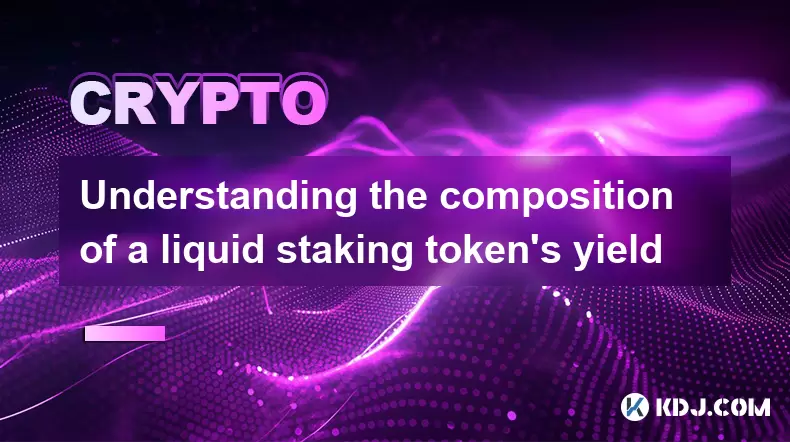
Understanding the composition of a liquid staking token's yield
Jul 20,2025 at 09:07am
What Is a Liquid Staking Token?A liquid staking token is a representative asset issued to users who stake their native cryptocurrency on a proof-of-st...
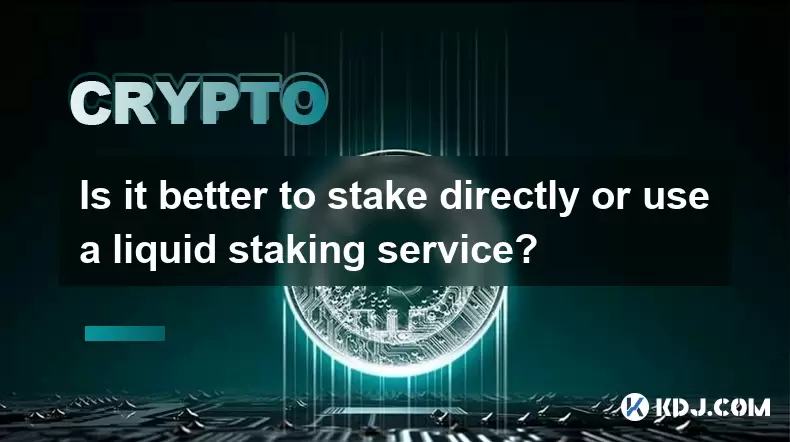
Is it better to stake directly or use a liquid staking service?
Jul 22,2025 at 08:21pm
Understanding the Basics of StakingStaking in the context of blockchain and cryptocurrency refers to the process of locking up digital assets to suppo...

What to do during an LST depeg event
Jul 20,2025 at 04:57pm
Understanding LST Depeg EventsAn LST (Liquid Staking Token) depeg event occurs when the token, which is typically pegged to the value of the underlyin...
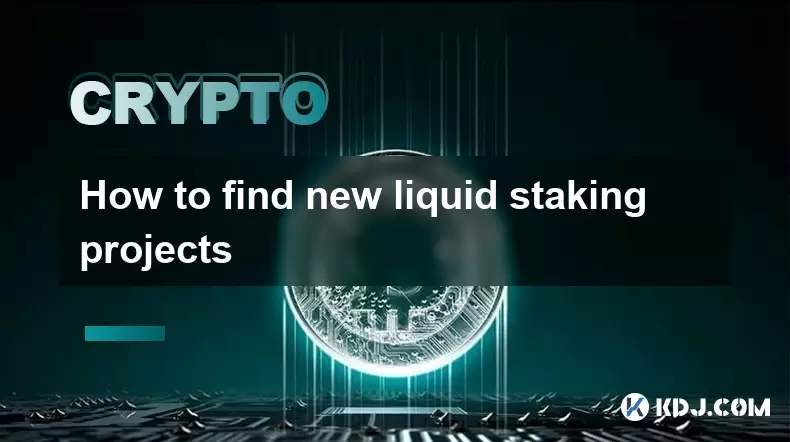
How to find new liquid staking projects
Jul 30,2025 at 01:14pm
Understanding Liquid Staking and Its ImportanceLiquid staking is a mechanism that allows users to stake their cryptocurrency assets while still mainta...
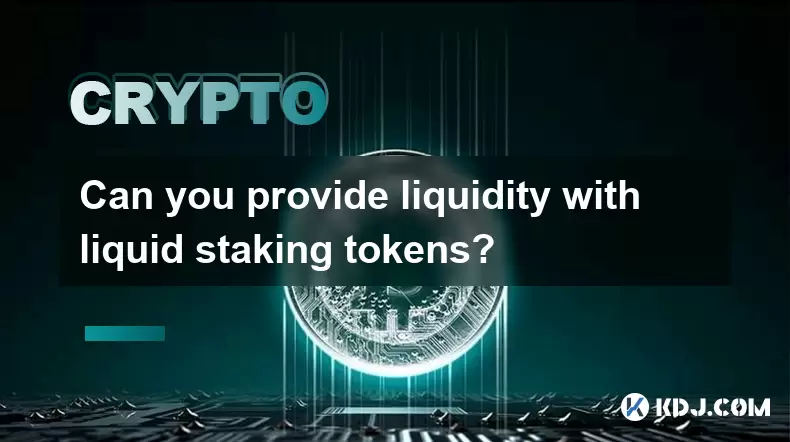
Can you provide liquidity with liquid staking tokens?
Jul 22,2025 at 10:22am
Understanding Liquid Staking TokensLiquid staking tokens (LSTs) are derivative tokens that represent staked assets on a proof-of-stake (PoS) blockchai...
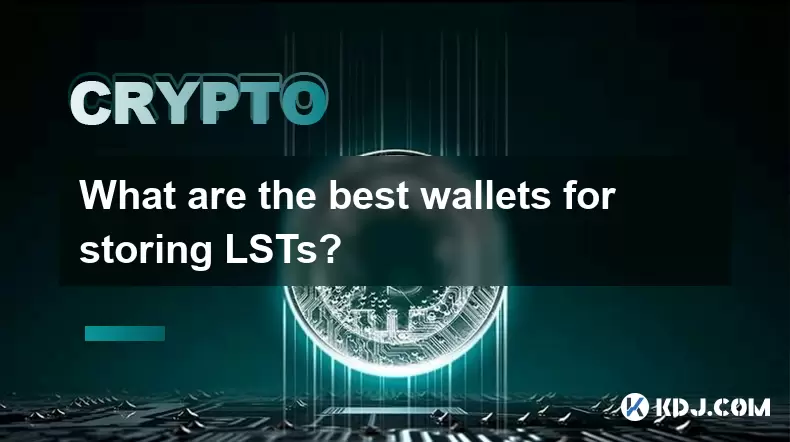
What are the best wallets for storing LSTs?
Jul 21,2025 at 03:14pm
Understanding LSTs and the Need for Secure StorageLSTs, or Liquid Staking Tokens, are derivative tokens representing staked assets on a blockchain. Wh...

Understanding the composition of a liquid staking token's yield
Jul 20,2025 at 09:07am
What Is a Liquid Staking Token?A liquid staking token is a representative asset issued to users who stake their native cryptocurrency on a proof-of-st...

Is it better to stake directly or use a liquid staking service?
Jul 22,2025 at 08:21pm
Understanding the Basics of StakingStaking in the context of blockchain and cryptocurrency refers to the process of locking up digital assets to suppo...

What to do during an LST depeg event
Jul 20,2025 at 04:57pm
Understanding LST Depeg EventsAn LST (Liquid Staking Token) depeg event occurs when the token, which is typically pegged to the value of the underlyin...

How to find new liquid staking projects
Jul 30,2025 at 01:14pm
Understanding Liquid Staking and Its ImportanceLiquid staking is a mechanism that allows users to stake their cryptocurrency assets while still mainta...

Can you provide liquidity with liquid staking tokens?
Jul 22,2025 at 10:22am
Understanding Liquid Staking TokensLiquid staking tokens (LSTs) are derivative tokens that represent staked assets on a proof-of-stake (PoS) blockchai...

What are the best wallets for storing LSTs?
Jul 21,2025 at 03:14pm
Understanding LSTs and the Need for Secure StorageLSTs, or Liquid Staking Tokens, are derivative tokens representing staked assets on a blockchain. Wh...
See all articles
























![[Audio stories] Streamer Became a Billionaire Overnight After Buying One Junk Coin [Audio stories] Streamer Became a Billionaire Overnight After Buying One Junk Coin](/uploads/2026/02/01/cryptocurrencies-news/videos/origin_697eaa9a495ed_image_500_375.webp)

















































